Can children in villages become programmers if they are taught only to railway workers? Conversation with the "Circle"
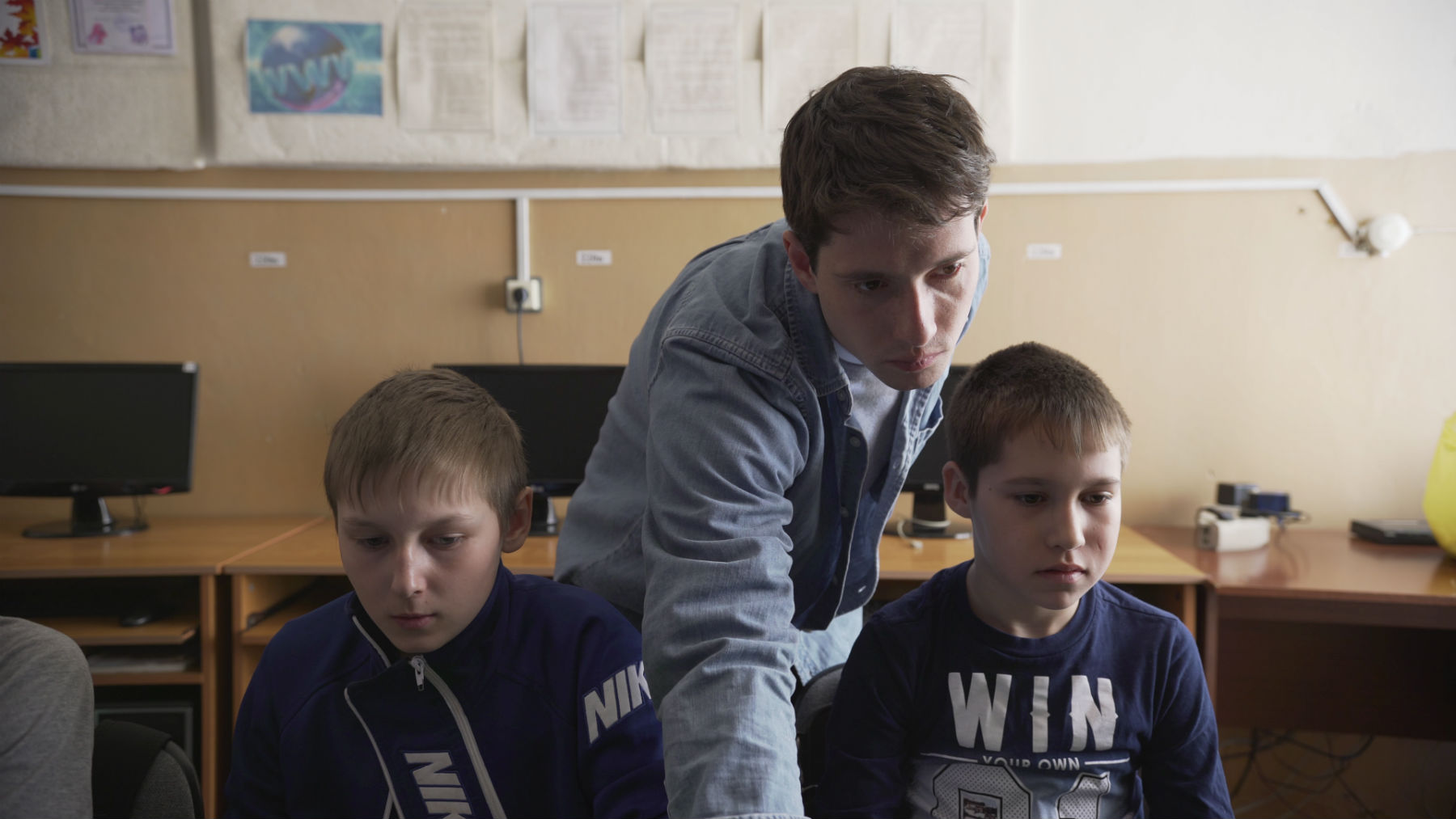
I did not think that in modern times there will be a place for stories when a person takes his knowledge, ideas about the world, and carries them literally on his own to faraway distances. But it was always interesting that such people are driven. Calculation, belief in the correctness, enthusiasm?
It turned out that such stories still happen. In 2017, several young programming teachers from the Moscow schools of additional education gathered in a team, called it “The Circle” and went to the cities of Russia to tell children about technologies. They visited Votkinsk, Kaluga, Vyazma. Then, in the village of Glazok, under the direction of the children, the children created a website , and immediately hit the television and the headlines of the largest media.
Now the “Circle” is going on a tour of 10 cities, and at the end of August it plans to hold a festival in the village of Sardayal .
Teachers of the Kruzhka Sasha Bratchikov and Alexander Patlukh told us with fillpackart what it is like to teach children how to program and engage in such “technological missionary work”.
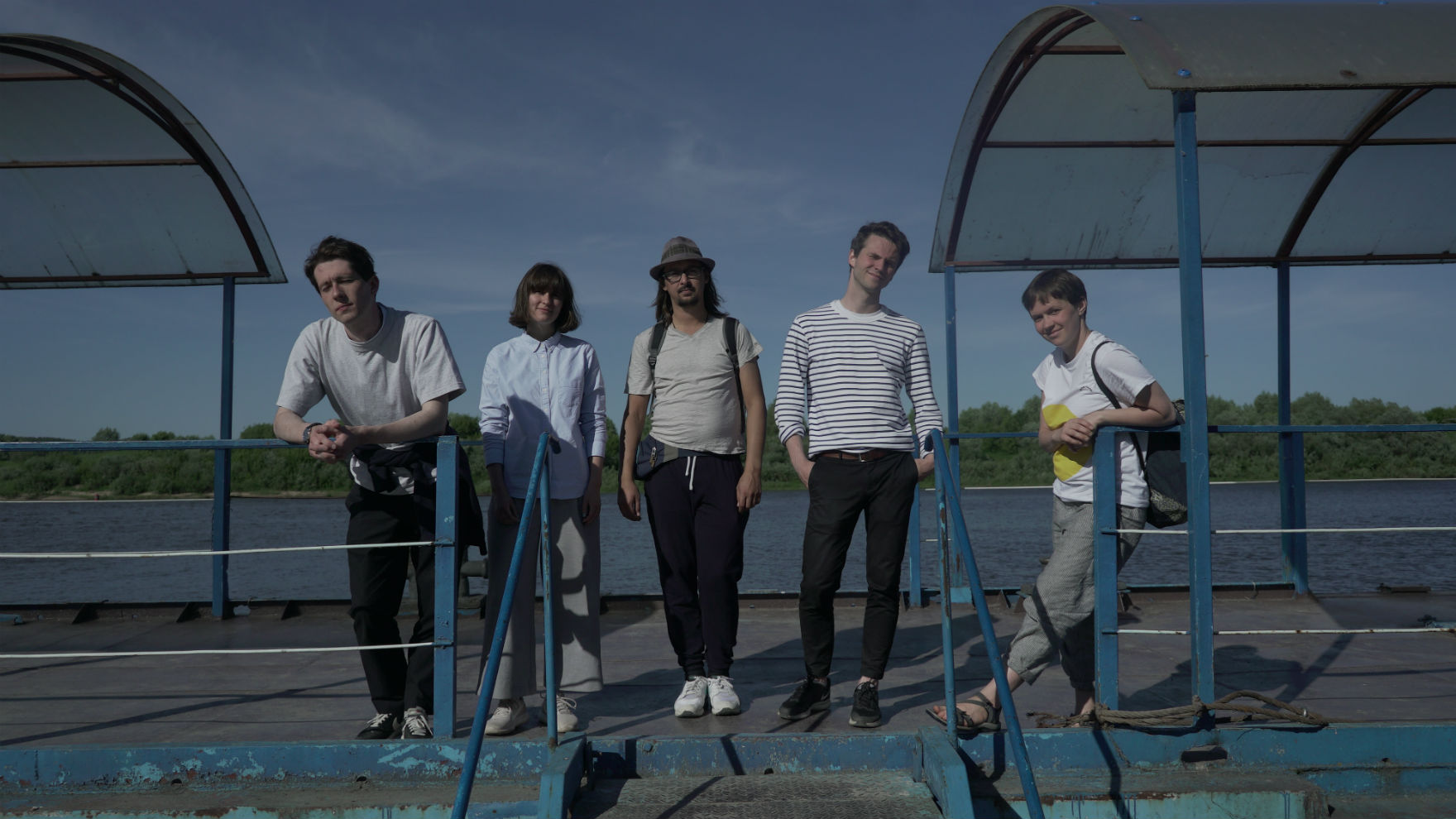
- I read, there is a certain Kohl from Vyazma who, after your courses, makes his own projects. How is he doing?
Sasha Bratchikov : - Yes, Kolya from Vyazma is a very good example. We tell everyone about him and we want more such examples. We initially wanted to put it on the rails, so that the children would continue and communicate with us. But it is difficult, their remote work should be supervised, and support events should be conducted. We have been doing less this lately, but still there are such unique examples of children who are dragging on their own interest and inner motivation.
- What exactly is he doing?
Alexander Patlukh: - He had a story with an online store of virtual goods, but he scored on it. He said that he wants to make a portfolio for himself, as a novice web developer. I asked for a couple of JavaScript courses. Feels that it is underplayed in this. Now, I think, studies them.
- You also said that during the pilot seven-day school, they stepped on a bunch of rakes. And what exactly happened there?
S: - Yes, it was in Votkinsk, the Udmurt Republic. By the way, the first and only city where classes were held not in school. We rented antikafe. Children came from all over the city, from different schools. Everyone came with their laptops. Nobody was interested in programming before, as far as I remember.
There were some major rakes. In Moscow Coding School, where we worked, we have formed several training programs. The first in web development - from the layout, and ending with JS, jQuery, and so on. The second Python program in Minecraft for children. With the help of the code they build houses and streets there. And the third in Arduino is the Internet of things, connected devices.
The initial concept was not that we give the child some kind of skill. We wanted to develop a certain technological horizon in him and tried to stuff all these three programs in seven days. Two days of web development, two days with Arduino, two days in Python.
Unprepared children were shocked by such an influx of information. They have not yet understood what html / CSS is, and we already talk about Python. All newbies have a lot of confusion in the syntax of the language, and when every two days you change the syntax, the child naturally has a misunderstanding.
- And how did they react, just run away, stop coming?
S: - No, they did not run away, but the moment came when you ask leading questions about the material of the last two hours, and the children simply do not understand anything, the entire audience. And you understand that you are doing something wrong. When two or three people do not understand, this is normal. But when the whole audience is a problem in you as a teacher, or in the program, its sequence.
A: - Well, they still have Minecraft. They fled into it.
S: - No, the children didn’t run up, they continue to be intuitively interesting, but their motivation decreases due to misunderstanding. So they decided to devote seven days to something alone. We stopped at the simplest - at the layout. We spend a lot of time on basic syntactic things, doing some simple websites.
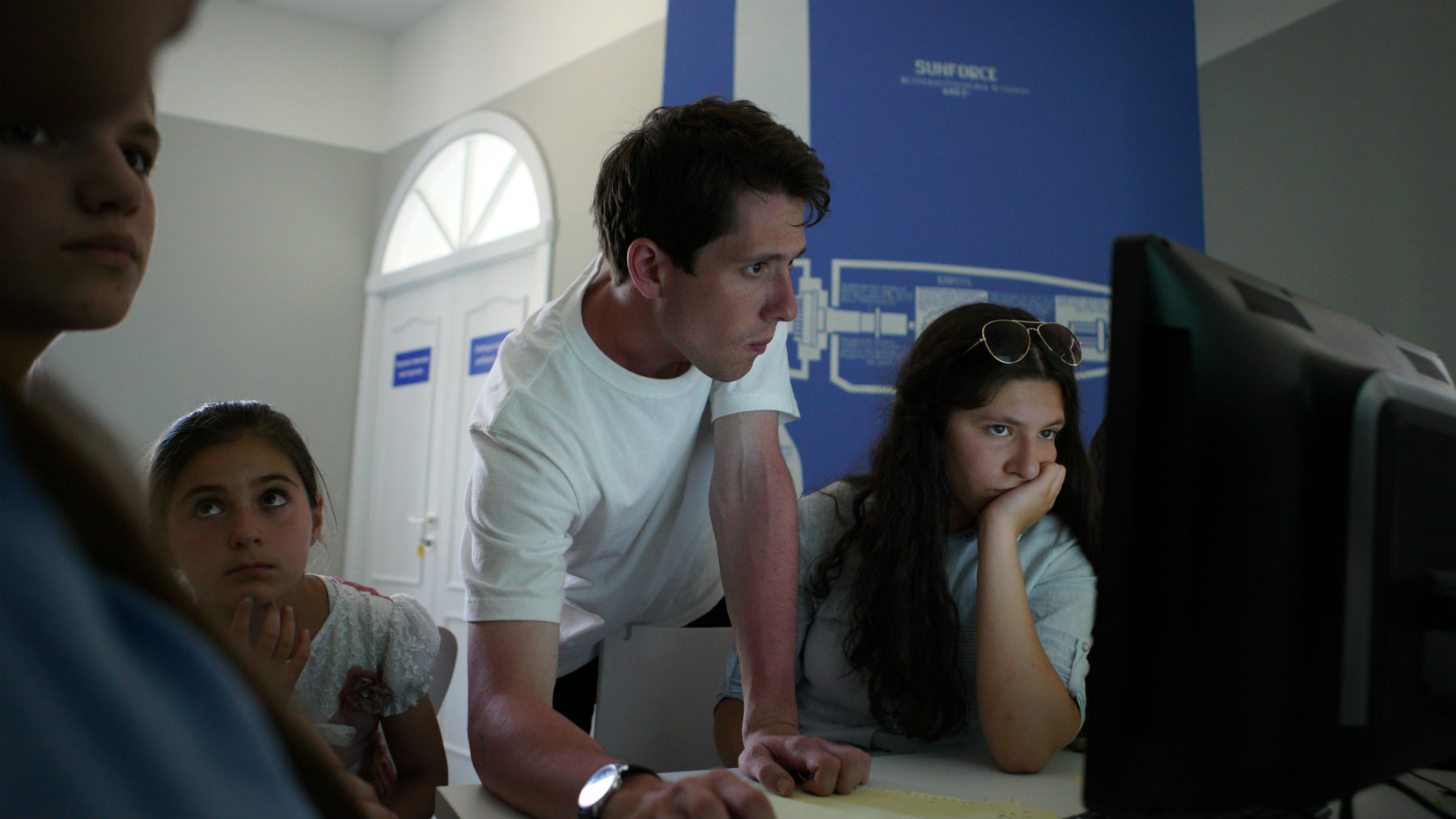
- When you come to the village, there is no feeling that no one here needs it, and nothing happens.
S: - I see it as a stereotype. When we went to Glazok, we weren’t sure ourselves that we would go in, but we tried.
If you think where did the paradigm come from, that people in the village do not need programming? This comes from the belief that the world is so arranged - what jobs are there nearby, where people should work. And in the village, people do something of their own.
It is clear that in our world this paradigm is changing a little. Jobs are no longer physically tied to a place. Migration flows are less and less due to work every year. Based on this premise, the argument that people in a village where there are no programmer jobs does not need anything — becomes false.
Even if people do not need it at the moment, this is no reason not to give them the opportunity to learn about the whole variety of things in the modern world, about programming, about new industries. Every five years something new happens in the technological world, and these people also have the right to know everything.
A: - Sasha speaks about stereotypes about binding jobs. But when you work with children, they have not yet formed these stereotypes. They also go to the Internet, watching YouTube channels. They have no binding in their heads yet, “I was born in a city where railway workers put sleepers, and I will also be a railway worker.” They have not yet accumulated the baggage of social pressure outside, which dictates this paradigm. Therefore, you come and see that they are interested in how the digital world functions. They also touch him.
S: - And we have a short period to grab onto this childlike unobstinacy and talk about all sorts of new things. Naturally, social pressure increases over the years, and people continue from generation to generation to do the same.
- Yes, I meant it. It's one thing how we represent stereotypes, and another is whether they have these stereotypes about themselves. Do they themselves feel inside that they don’t need it? But if not, then great.
A: - They have a huge interest, we have never met with obvious rejection.
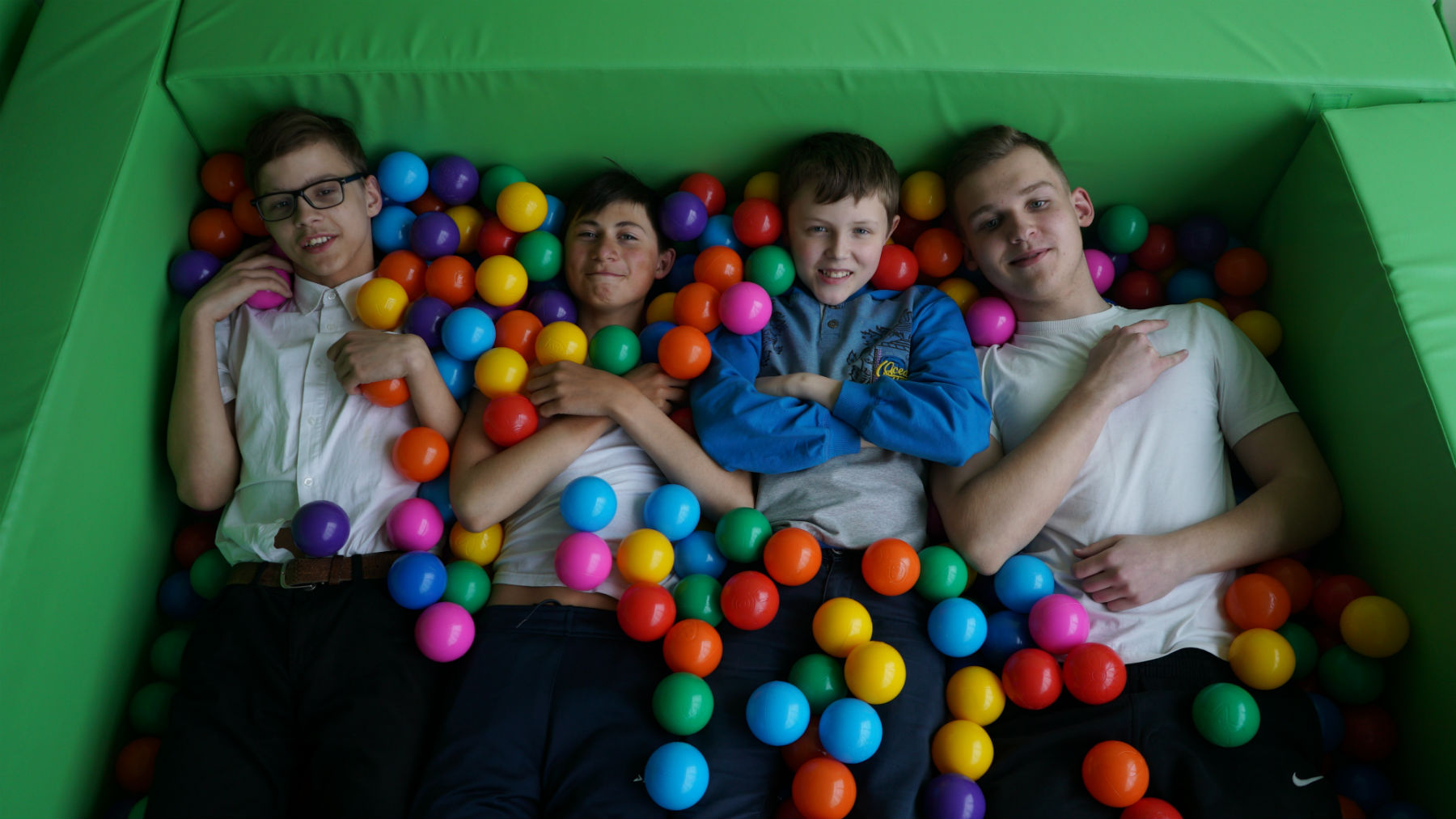
- After Glazk's talking about you. When this happened, other developers did not want to go with you around the villages and teach what they could do?
From: - Constantly write. People wrote from Yandex, they write not only from Moscow, but from all over Russia. People from other spheres are writing - designers, illustrators. With the next iteration of the tour, we naturally want to expand. It will be not only technology, but definitely something else. All these people definitely want to attract. The more people, the more efficient you can work.
A: - In general, everything is under the auspices of "not only" - not only technology, not only us. Maybe not only in Russia.
How expensive are the trips and where to get money from them
Votkinsk is the hometown of Sasha Bratchikov. Despite this, the first trip, according to the guys , was the most expensive - 80 thousand rubles.
“This amount includes tickets, accommodation, printing merch: t-shirts and posters that we hung around the city. Votkinsk - the most distant city of all where we went. Accommodation was relatively cheap by the standards of Moscow and St. Petersburg, but we lived in a six-room apartment with six of us. This gave rise to all sorts of domestic troubles. ”
The guys tried to find funding, hoped for large technology companies, but did not grow together - the first two trips were paid from their wallet.
“With regard to the tour, of course, we thought about grants and support programs. But they quickly realized that only one clarification of the bureaucratic rules of the game would take away a huge amount of time and energy from us, without offering anything in return, ” they said .
As a result, the company Makeomatic, in which Sasha works, assumed a part of the expenses. She pays for tickets and part stay.
About the education system and its problems
- I recently interviewed applicants, and one and all believe that higher education is necessary for working in IT. Do your guys think so too?
S: - In any field you can work without higher education. It is clear that in some areas and in some positions computer science will be a big plus not only in terms of the line in the summary, but in general - in terms of development and preparedness.
A: - This is a very personal thing. There are people who are able to drag such things on their own that no university has ever dreamed of.
Phil: - Would you send your children to college?
A: - Yes, but it would not necessarily be programming or computer science. Speaking personally, I look at the university not only as a way to get knowledge. A university is a lot: learning how to learn, systematizing thinking. Communication, damn it! I think this is all important.
But I would not deduce the role of fundamental education to the level that it is directly necessary for work in the IT industry.
“Those who are already working, usually say so -“ children are simply naive and do not understand that it is possible to work without it ”.
A: - To be honest, during the trips we didn’t even talk about it, whether they want to go to universities or not. They have a traced life path there. Usually he is tied to an educational institution in the area where they live. They want to learn or do not want, they did not tell. In Yandex, everybody wants to work, if you ask.
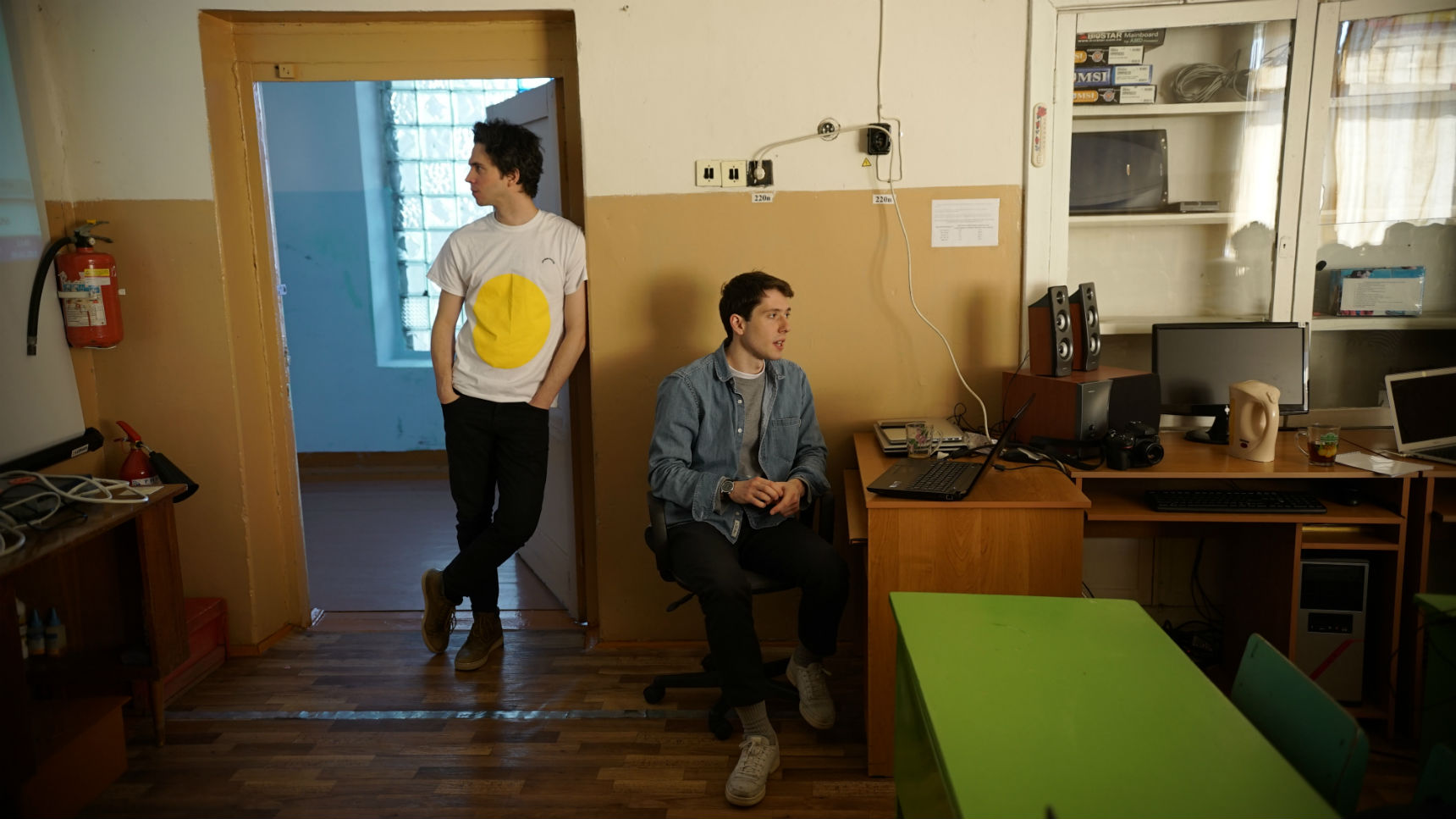
- Do you think Russia has a problem with IT education?
A: - Yes, here we are doing this. There is clearly something wrong with him. A good basic mathematical base is given, but the system is rather outdated. She lives in paradigms that originated in the Soviet era. Often not practical technologies are studied. This leads to the fact that the natural interest of children remains dissatisfied. At the same time the load is constantly growing.
From my point of view, all this has accumulated in a snowball, which should get additional education. It will provide alternatives, perspectives. Most importantly, I believe that it will receive a status that will allow it to be in demand, having not a crust, but knowledge.
For which I want to drown.
F: - For example, I studied at home with a book. Then they took me to work as a junior and so it went. And you?
A: - I graduated and even have a degree, but not a technical level - I am a sociologist. The first time I felt Python in order to parse the results of sociological research. Then, of course, the web finally demolished me. I started working in all sorts of advertising and near-advertising agencies. That is, my main way of studying development is mentoring. I was shown, told, I repeated, wrote some things myself. And now all the new technology is Hi YouTube and Coursera.
F: - So you faced development because you needed it as a tool?
A: - It is not that it took me hellishly - it simplified my life. Sociological studies could be processed in all kinds of programs like SPSS, but they look like a terrifying product of 1C from the beginning of the 90s. And when Python solves your problem by writing a couple of scripts, it makes it easy on the soul.
S: - I have education that is cybernetics and mathematical methods in economics, any statistics is what is now called data science. I worked in St. Petersburg in a company that deals with analytics in advertising (RTB), predicts how to buy a client on the Internet in the best way. I did analytics there, wrote in Python and in R for statistical processing.
I have always been hovered that I will write some script, but then the developers still have to implement it. I myself wanted to do these things with my own hands. So carried away by the development, settled down in a small bureau in the june, which does everything completely turnkey - front and back. There I had acquaintances, they took me without an interview. I said that I can do something, but in general I don’t know anything and really want to learn.
F: - I think you both have a pretty cool case. You didn’t come to the development because you wanted to be developers before you realized what it was - but first you tried, you rolled it in and then decided to learn.
S: - Yes, I studied at the St. Petersburg Physical Mathematics College. The guys from there go, for example, in ITMO, become winners of ACM. There, many sat in circles until 11 pm. The teachers were wildly charged.
And I had absolutely no interest in this. I thought, since I do not sit until the night, like the others, then programming is not for me. But since I spent 10 years at the Physics and Mathematics College, I must choose something more or less technical. So I chose the mean - mathematics in economics. But then there was no awareness, awareness came later.
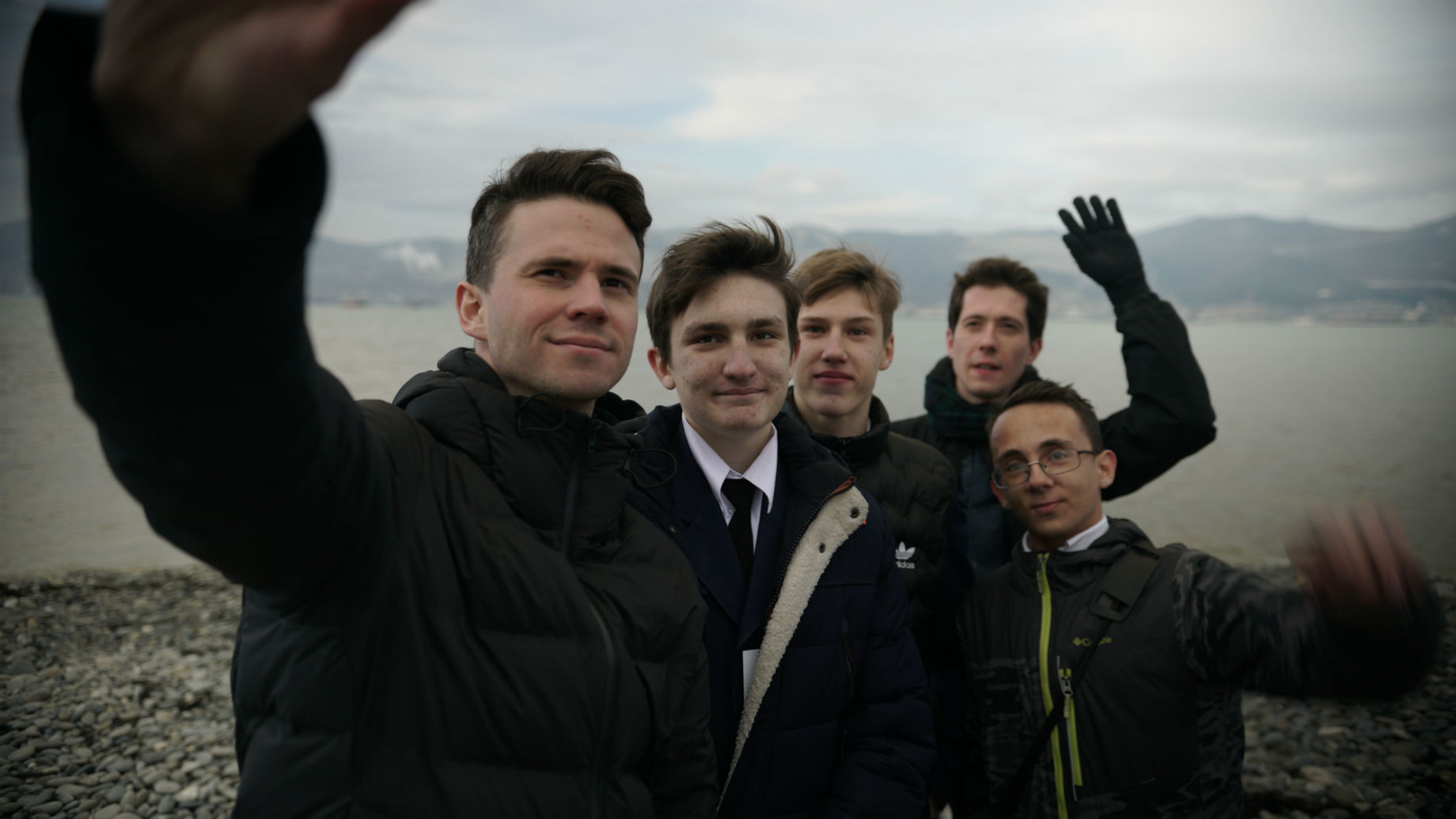
About teaching in programming schools
- Do you work by teaching programming courses?
S: - We all taught in one way or another. We generally met at the Moscow Coding School. This is a school where, as a rule, beginners are taught the basics of something.
F: - Can you tell us how these programs work?
A: - Now they are arranged a little differently than when we met. Then it was an exclusively offline format, strongly practice-oriented. It was usually six days of intensive days on weekends. Five hours you will kodish every weekend for three weeks, get a bunch of micro-projects for the campaign and one more or less ready at the end.
At this school, the atmosphere was very cool. Now it has become only online, so you can’t talk about the atmosphere anymore. And then the repch played there, people from creative industries came - designers to learn how to impose, or designers who learned how to impose, came to learn JS to create interactive layouts. It was pretty perky, fun and cool.
In essence, we were joined together by the fact that we were raising a children's direction.
F: - Tell me, which stacks are familiar with?
C: - The main language I work with is Javascript. I came to the office, which has such a pretty start-up stack. We make new small projects. We have a full stack of JavaScript, React with Redux on the frontend, Node.js and some Ruby on the backend. In mobile, this is mainly Java and Swift, about a year ago started using React Native.
A: - I also have everything around JS. I love Vue.js, I can do a little django.
F: - Do you work with typed JS? FlowTypes using?
S: - Yes, we use. We generally develop our open-source office in the bureau where I work. He is not yet very famous called Microfleet - this is a toolkit for creating your own microservices. They have been working in production for about five years, and we decided to roll everything into open source. There we all type on Flow. Tulkit is not very popular yet. I started practicing it, and it took me a couple of weeks somewhere to dive into the code base. Much is not documented, the entry threshold is quite high, and such projects, as a rule, are not popular in the open source. But further in the company we will develop our own open source brand.
F: - Has there ever been a feeling that there is not enough knowledge to teach?
S: - No, we teach children, this is a different order of complexity. We have a short-term intensive course for beginners, we do not go further than typesetting.
A: - And we all make up awesome.
“But in school you were not only taught to children.”
From: - Here I try to look for some interest for myself, to teach things that I don’t know myself. JS I usually do not teach. Almost a year ago I went to the Tumo Armenian Center for Creative Technologies. We started with a startup, which made sensors that read different biometric data of a person - cardiogram, myogram, galvanic skin response, electroencephalogram, alpha beta wave.
And I went there with such a course for children, despite the fact that I knew nothing at all. I simply plunged into the topic for two months, and the guys and I developed a program on how to read human data, how to transform this data, how to draw conclusions based on this data. Even how to make various applications. For example, you read a person's data with the help of these sensors, form a certain profile of how a person feels at the moment, and you turn to the api of the same Spotify, so that he based on this data offers you music.
F: There was no such case that he taught something, and then he realized that he was wrong and taught the wrong thing?
A: - Well ... I had this with JavaScript. But not critical. So, minor bugs. Of course, if you talk about asynchrony, then it should be rolled in better.
S: - Did you have that you didn’t talk about synchronicity and didn’t understand something?
A: - Yes, yes. I nakosyachil there, then I had to write a big post to all students. Like, guys ...
S: - ... I was wrong.
A: - It’s not that it’s wrong, so corrected the key points.
F: - Well, no one is insured.
A: - It happens that you tell from a practical point of view, and in the process you climb into the foundation, which you have is quite shaky. Then you read an article that best tells the root cause of what you use in practice every day. And you understand that not exactly expressed.

What and how "Circle" teaches children
You are now teaching children HTML / CSS, layout. Why from all programs have chosen this one?
A: - Children are interested when the result is fast, and right on the spot. Since they are almost all zero, they need something simple, causing an internal wow effect. We need a tool that allows you to tell your own words about what they are interested in - these are web, images, html, CSS, and all this beauty.
At the zero stage, they have little interest in thinking through the logic of interactions, interactive. They need to quickly throw out their creativity on a laptop monitor. Layout gives a very simple entry into technology. They easily cease to be afraid of the code, they understand that from idea to realization, half a step.
- Wasn’t it more interesting for them to study Python in Minecraft?
A: - There is no such vastness of self-expression. In Minecraft, the child is unlikely to come up with a project about carp fish - he just likes to catch her in the river. If he is tied to building a building, making a moving object, it is fascinating, he speaks there not in his own words.
We are going to these cities to reveal the children, to give them a way to tell about their area or about their hobbies - in their own words. We could probably use some more graphical pieces that also come in easily, such as p5.js. But it would be a visualization, an illustration, and a website is a website. Every day they communicate with sites, they understand the result, and it is clear which way to go.
- Well, what about robotics?
And: - This is a thrill, but here you need to buy iron, but we have no money.
S: - The problem is that you have to constantly ride with this equipment, collect it, conduct courses on it, and then take it away. And this is strange - the children will not be able to continue to do anything themselves.
Plus there is such a moment in robotics: you purchased a number of components, made all possible projects with them, and you need to buy something new. To do this, you need money, and where we go, not everyone has the opportunity to spend a lot of money on their education. They would have to order components from abroad or at least from Moscow. This is hardly anyone will do.
F: - Before you make a course, did you somehow systematize your knowledge?
A: - Before the “Circle” we have already read these courses many times, so, perhaps, this was not required. And initially the process of creating courses of course requires it. In the “Circle” the systematization was more likely to put it in the most short-term format possible - in order to complete the project in seven days, to make it beautiful and spectacular.
A documentary film about the train "Circle" in the village of Glazok
F: - Were students taught to google all these things? They said that you can read the specifications?
A: - Of course! “Find everything on Google” is a leitmotif. Sergei of our team has a great heartfelt speech, which he utters at the end. If you have a tool and the ability to search for something on the Internet, you can move mountains in a week. And if there are still people who support you in this - then in general, beauty!
S: - We are trying to convey to the guys that the ability to google is a very important skill. Often, even in the adult courses at the Moscow Coding School, we faced people who simply do not know how. They are either afraid of sites in English with code, or something else.
There is always the fear to speak English. But when you start speaking, even if your grammar is not very good, fear goes away. Also with the ability to google, read the documentation - it is necessary to overcome, and then everything goes very cool. We must not be afraid to google and read in English.
F: - Explain to students how everything is arranged inside?
A: - Yes, on the first day they practically do not sit at the computer. We just show something on the projector, play games with them, one way or another connected with the device websites. We say what a client, server, IP-address. There is a set of methodological toys that we use on the first day in order to enter the context of the environment where they will work. For example, they invent their own IP-addresses and so on.
S: - But with this the main thing is not to delay. Naturally, we do not dig in the details of the engines inside browsers. When children do not understand something, they very quickly fade away. We have an initial theoretical block, but on the whole we profess the imposition of theory on practice - when you did something, something happened and then we explain what it was. If we explain all the basics, the whole theory, and only then begin to write code, then all the children will simply run away.
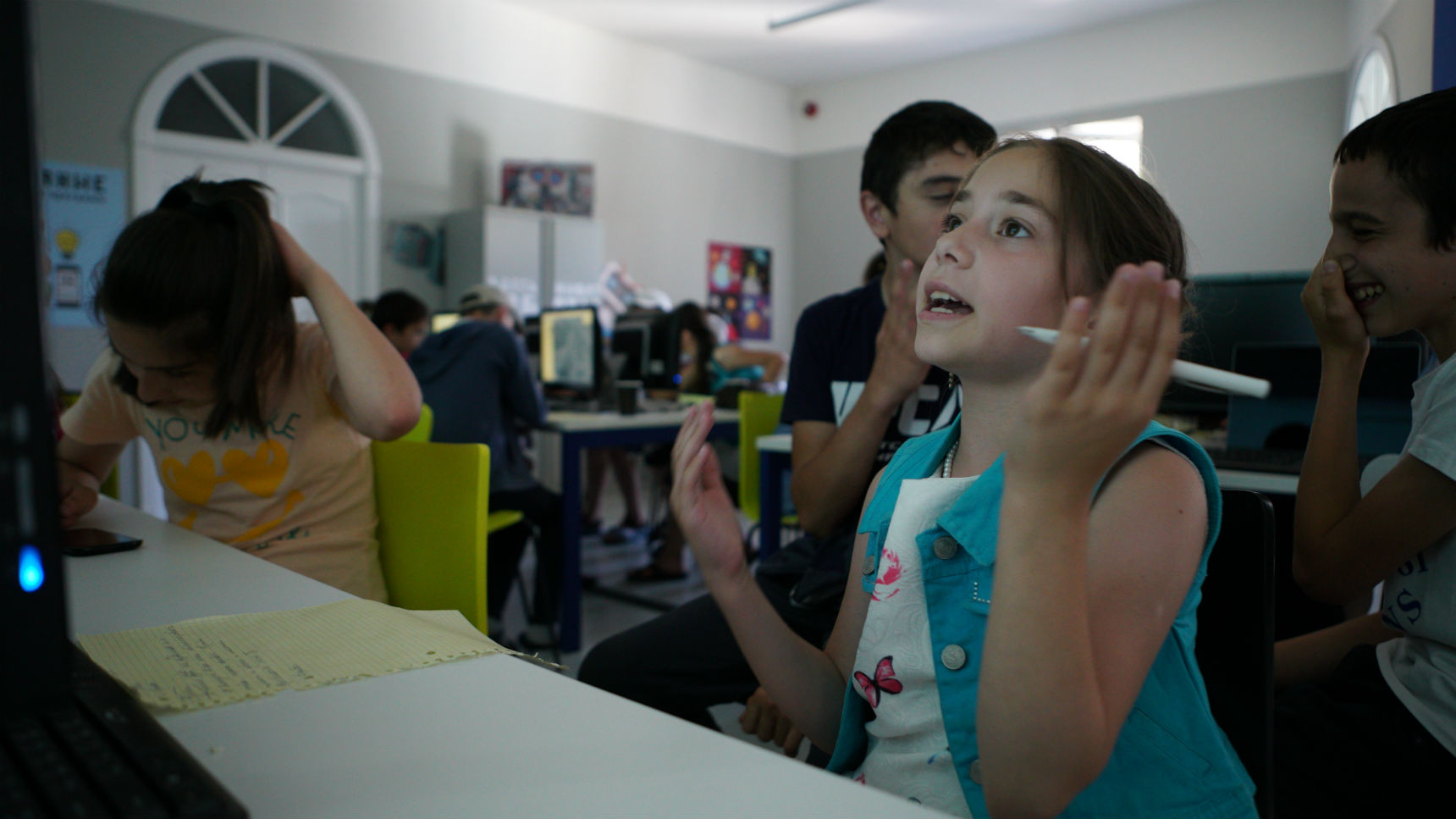
About responsibility and future
F: - Do not you think that entering into the IT sphere through layout can create problems in the future? That is, you determine the direction in which they will work further.
A: - Well, the question is clear. I thought about him ...
No, it seems to me, it does not create problems. The Internet will always be. This is already a new literacy, the site should be able to make any graduate of the school. This should be like a Power Point Presentation. I would not even associate it with the entrance to the IT world. We just give the basic skill, which is still interesting, and removes the barrier that the characters in the text editor can turn into something else.
S: - Now we are talking about the web, but maybe in the future we will expand. Or maybe our example will inspire someone who will make non-web-related courses in their city.
That is, our story has a function to inspire other enthusiasts to organize something similar in their cities. And we will be happy to help them.
F: - What do you think, many can be interested in developing not only user interfaces?
A: - Zero? You can of course, but I would not take it. It would be a cool challenge. It would be necessary to work out the course for at least a year, so that it would be interesting to climb back to the ground from scratch.
F: - Will there be a problem with motivation?
A: - I do not think that there is a problem in motivation. They are motivated by things that are not at all educational - Sasha is great at playing football with them, and therefore they want him to be coding tomorrow. Or they are simply motivated by the fact that we code funny things. For example, Seryozha asked the house to look at three memes on the Internet.
The motivation of these students is very tied to the persons of the teachers. They are more inspired not by the fact that we code, but by the way we behave with it. Against this background, everything becomes quite fun and interesting.
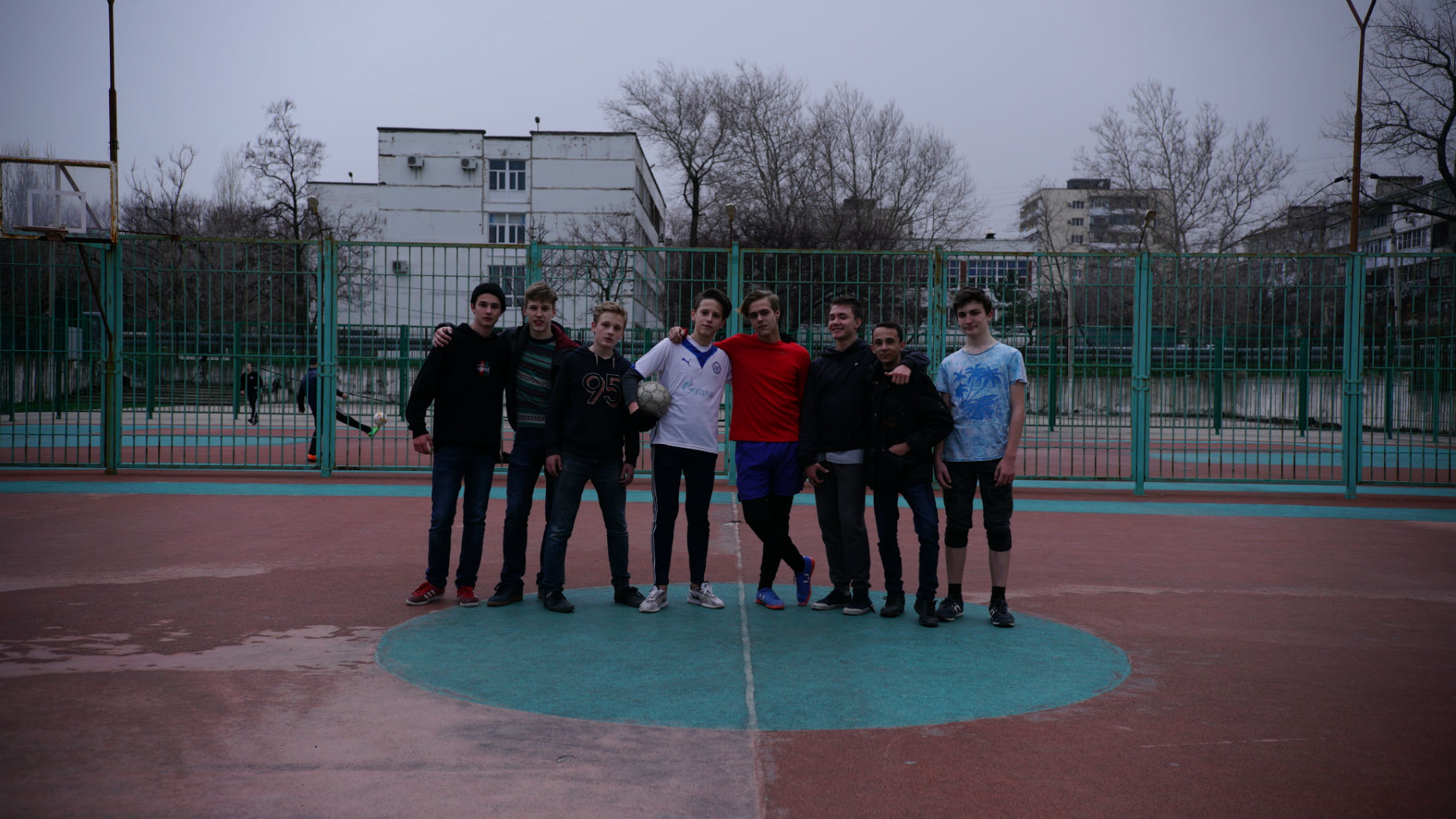
- You do it all for free?
A: - Yes, children pay nothing for it.
- It turns out that this is not just interesting for you - do you really believe in it?
A: - Of course! It is very important!
- Why is it important?
A: - In general, everything becomes clear when you come to a city for the first time, and they say: “you know, if you were not, I would never have done it.” That would never happen to me. ” After this comes the turning point. I cherish the idea that Ilon Mask is growing somewhere in the village of Glazok. If I attach my hand to this, help him, then life is lived not in vain.
S: - The thought that moves me also came somewhere during the Eye. I have already said that a person’s life is predetermined, by the place where he was born, by circumstances, by external pressure. If there is a college of Russian Railways nearby, then most of the children become railway workers. It is predetermined since childhood.
There is a feeling that it is necessary to break into some other stories, to make children - as long as they are not blinkered - a more complete picture of the world. Say that they have a choice. Perhaps this choice will allow them to live a happier life.
It is necessary to convey a new outlook to the place where it is not.
- Do you have a sense of responsibility for them? Their path was predetermined, and you came and, perhaps, changed it.
A: - I feel ... you're seven days with these children, and often you give life advice not even about coding - but about how to be a normal person. Some guys in Dagestan had to explain that fighting is not very good.
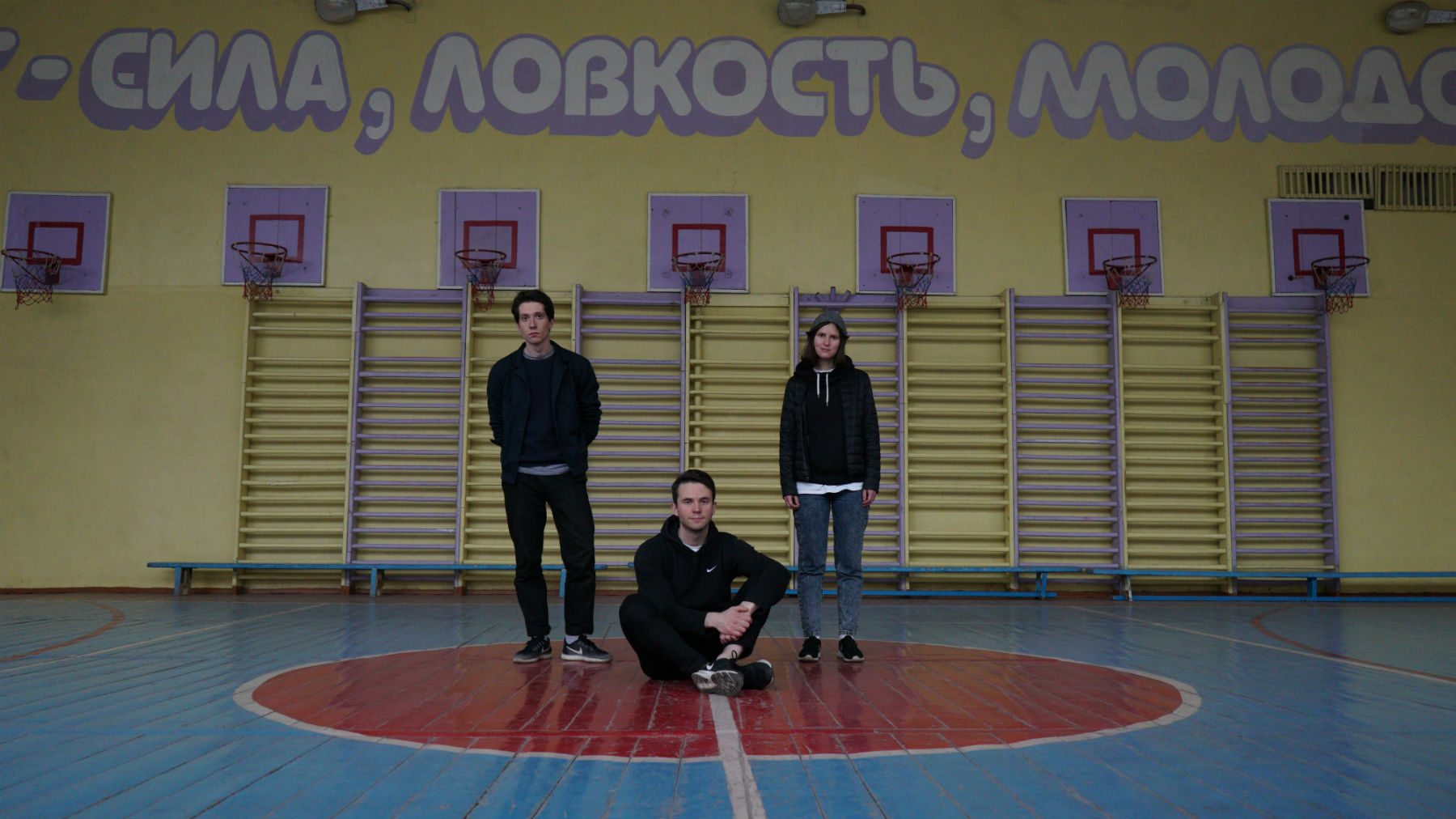
F: - Do you think being a developer is cool?
A: - Yes.
S: - Yes, that's cool.
F: - Why?
A: - Because you are a creator. You are exactly creating, not destroying. Because you use the brain at the level that it is supposed to. Because it stimulates you to constantly learn and be better.
